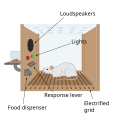Reinforcement
Reinforcement is a term used in behavioral psychology to refer to the process of increasing the likelihood or frequency of a specific behavior by providing a consequence that the individual finds rewarding. This concept is a fundamental aspect of operant conditioning, a type of learning in which an individual's behavior is shaped by its consequences.
Types of Reinforcement
There are two main types of reinforcement: positive reinforcement and negative reinforcement.
Positive Reinforcement
Positive reinforcement involves the addition of a rewarding stimulus following a behavior, which increases the likelihood of that behavior occurring again in the future. For example, if a child receives a piece of candy after cleaning their room, they are more likely to clean their room in the future.
Negative Reinforcement
Negative reinforcement involves the removal of an aversive stimulus following a behavior, which also increases the likelihood of that behavior occurring again. For example, if a person takes an aspirin to relieve a headache, the removal of the headache reinforces the behavior of taking aspirin.
Applications
Reinforcement principles are widely applied in various fields such as education, psychology, animal training, and behavioral therapy. In education, for instance, teachers often use reinforcement to encourage positive behaviors in students. In behavioral therapy, therapists use reinforcement to help clients change undesirable behaviors.
See Also
References
This article is a psychology-related stub. You can help WikiMD by expanding it!
This behavior related article is a stub. You can help WikiMD by expanding it.
Reinforcement
Transform your life with W8MD's budget GLP-1 injections from $125.
W8MD offers a medical weight loss program to lose weight in Philadelphia. Our physician-supervised medical weight loss provides:
- Most insurances accepted or discounted self-pay rates. We will obtain insurance prior authorizations if needed.
- Generic GLP1 weight loss injections from $125 for the starting dose.
- Also offer prescription weight loss medications including Phentermine, Qsymia, Diethylpropion, Contrave etc.
NYC weight loss doctor appointments
Start your NYC weight loss journey today at our NYC medical weight loss and Philadelphia medical weight loss clinics.
- Call 718-946-5500 to lose weight in NYC or for medical weight loss in Philadelphia 215-676-2334.
- Tags:NYC medical weight loss, Philadelphia lose weight Zepbound NYC, Budget GLP1 weight loss injections, Wegovy Philadelphia, Wegovy NYC, Philadelphia medical weight loss, Brookly weight loss and Wegovy NYC
|
WikiMD's Wellness Encyclopedia |
| Let Food Be Thy Medicine Medicine Thy Food - Hippocrates |
Medical Disclaimer: WikiMD is not a substitute for professional medical advice. The information on WikiMD is provided as an information resource only, may be incorrect, outdated or misleading, and is not to be used or relied on for any diagnostic or treatment purposes. Please consult your health care provider before making any healthcare decisions or for guidance about a specific medical condition. WikiMD expressly disclaims responsibility, and shall have no liability, for any damages, loss, injury, or liability whatsoever suffered as a result of your reliance on the information contained in this site. By visiting this site you agree to the foregoing terms and conditions, which may from time to time be changed or supplemented by WikiMD. If you do not agree to the foregoing terms and conditions, you should not enter or use this site. See full disclaimer.
Credits:Most images are courtesy of Wikimedia commons, and templates, categories Wikipedia, licensed under CC BY SA or similar.
Translate this page: - East Asian
中文,
日本,
한국어,
South Asian
हिन्दी,
தமிழ்,
తెలుగు,
Urdu,
ಕನ್ನಡ,
Southeast Asian
Indonesian,
Vietnamese,
Thai,
မြန်မာဘာသာ,
বাংলা
European
español,
Deutsch,
français,
Greek,
português do Brasil,
polski,
română,
русский,
Nederlands,
norsk,
svenska,
suomi,
Italian
Middle Eastern & African
عربى,
Turkish,
Persian,
Hebrew,
Afrikaans,
isiZulu,
Kiswahili,
Other
Bulgarian,
Hungarian,
Czech,
Swedish,
മലയാളം,
मराठी,
ਪੰਜਾਬੀ,
ગુજરાતી,
Portuguese,
Ukrainian
Contributors: Prab R. Tumpati, MD




